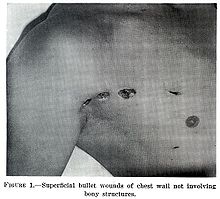Wound Classification
- Clean wound: made under sterile conditions, likely to heal without complications
- Contaminated wound: resulting from accidental injury, contains pathogenic organisms and foreign bodies
- Infected wound: pathogenic organisms present and multiplying, exhibits clinical signs of infection
- Colonised wound: chronic situation, contains pathogenic organisms, difficult to heal
- Critical wounds: including large burns, can cause serious hydroelectrolytic and metabolic alterations
Types of Open Wounds
- Incisions or incised wounds: caused by a clean, sharp-edged object
- Lacerations: irregular tear-like wounds caused by blunt trauma
- Abrasions (grazes): superficial wounds where the topmost layer of the skin is scraped off
- Avulsions: injuries where a body structure is forcibly detached
- Puncture wounds: caused by an object puncturing the skin
Types of Closed Wounds
- Hematomas: caused by damage to a blood vessel, blood collects under the skin
- Contusions: hematomas that originate from an external source of trauma
- Crush injury: caused by a great or extreme amount of force applied over a long period of time
Wound Presentation and Diagnosis
- Bacterial infection of wound can impede the healing process and lead to complications
- Radiography is used to ensure there are no hidden bone fractures
- Workup includes evaluating the wound, its extent, and severity
- Cultures are obtained from the wound site and blood
- X-rays are obtained and tetanus shot may be administered if necessary
- Wound progress can be observed using techniques such as photographs with area quantification, wound tracings on acetate sheets, and Kundin wound gauge
Wound Management and Alternative Treatments
- Treatment depends on the type, cause, and depth of the wound
- Recent lacerations involve examining, cleaning, and closing the wound
- Minor wounds like bruises will heal on their own
- Abrasions require no active treatment except keeping the area clean
- Puncture wounds may be prone to infection and the entry is left open to remove bacteria or debris
- Closure techniques include bandages, cyanoacrylate glue, staples, and sutures
- Dressings and creams containing silver do not have evidence of preventing infection or improving healing
- Honey is more effective than antiseptic followed by gauze for healing infected surgical wounds
- Therapeutic touch has no proven benefits in wound healing
- Over 400 plant species have potential for wound healing, but research is limited
- Only three randomised controlled trials have been conducted for the treatment of burns
A wound is a rapid onset of injury that involves lacerated or punctured skin (an open wound), or a contusion (a closed wound) from blunt force trauma or compression. In pathology, a wound is an acute injury that damages the epidermis of the skin. To heal a wound (to regenerate a tissue to its original state), the body undertakes a series of actions collectively known as the wound healing process.
| Wound | |
|---|---|
 | |
| Wounds on a male torso | |
| Specialty | Emergency medicine Plastic Surgery |